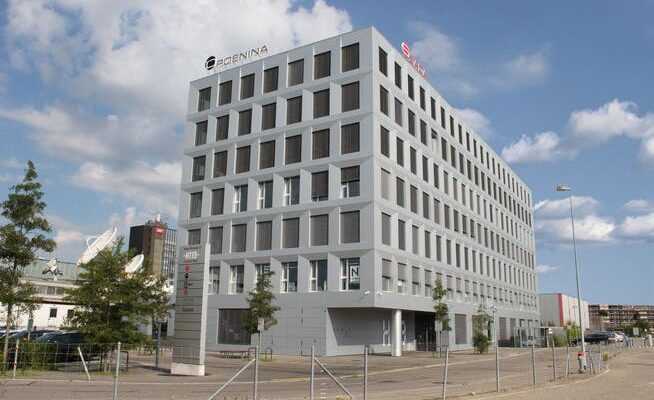With Burkhalter and Poenina, two important Swiss installation companies from the electrical and building technology sector are merging. The merger is also an attempt to prepare for the expected rush of customers in connection with the energy transition proclaimed by the federal government.
At the Poenina building technology group in Zurich, the number of employees increased by almost a quarter last year due to the strong order situation.
Anyone looking for an electrician or a heating engineer in Switzerland can tell you a thing or two about it: craftsmen for repairs and installations in the field of building services are often fully booked for months, and there is no improvement in sight. “The demand in the Swiss market is extreme, there is an overhang everywhere,” said the President of the Board of Directors of Poenina, Marco Syfrig, at the balance sheet media conference of the Zurich building technology group.
Grown by a quarter
Those who, like the company from Opfikon, have a large workforce are more likely to be able to accept orders. Last year, the number of Poenina employees increased by almost a quarter to almost 1,400, including 300 apprentices.
In the future, the company, which has grown strongly through acquisitions since it was founded twelve years ago and offers installations in the areas of heating, ventilation and sanitary technology, is to become part of an even larger entity. As expected, the examination of the merger with the Burkhalter Group from Zurich, which specializes in electrical installations, which was announced on January 19, 2022, led to a positive result.
Now only the shareholders of the two companies need to approve the project at their upcoming ordinary general meeting. This should happen on May 30 (Poenina) or May 31 (Burkhalter). Burkhalter also presented the business figures for the past year on Tuesday. When added to Poenina’s results, the combined company reports sales of around CHF 930 million, an operating profit (EBIT) of CHF 50 million and net income of CHF 40 million. The combined workforce is 4600 employees, including 900 apprentices.
Ambitious specifications from Bern
This also means that the Poenina Group and its shareholders, whose existing shares are to be exchanged for new Burkhalter shares at a ratio of 1 to 0.73, are entering the merger as junior partners. For Christoph Arnold, who last August replaced former CEO Jean Claude Bregy, who had fallen out of favor for property crimes, the merger is nothing but logical. It not only improves the position in the tight labor market, but is also essential so that both companies can optimally contribute to the realization of the ambitious goals that the federal government has set itself with its Energy Strategy 2050.
The specifications from Bern stipulate that the current energy requirements of the entire Swiss building stock will be reduced by practically half. The greatest savings are to be achieved in the energy used for the indoor climate. Oil heating is now really passé, said Arnold, and even with gas heating it was noticed that there were better solutions.
Pressure on margins despite full order books
Against this background, the building services industry sees a flood of orders, especially for existing buildings. It is foreseeable that countless properties will have to be energetically renovated, said Gaudenz Domenig, Chairman of the Board of Directors at the Burkhalter Group’s media conference – which was still held separately. In order to be able to respond better to the needs of apartment building owners in particular, the expanded Burkhalter Group intends to operate a planning office in the future that will propose complete solutions.
With the development of this business, the hope is linked to being able to achieve higher margins with customers than before. Despite the good order situation, the EBIT margin for 2021 at Burkhalter and Poenina was limited to around 5 percent each. Both companies are suffering from the strong price pressure that prevails in large parts of the Swiss construction ancillary trades and especially in construction itself. Domenig, who is also to preside over the board of directors of the merged company, mentioned 7 to 8 percent as a medium-term margin target, but not without immediately qualifying: “I can’t promise anything.”
Syfrig intends to stand for election as a simple member of the Board of Directors. Zeno Böhm, the previous CEO and former CFO of Burkhalter for many years, is still planned as head of the group. Arnold is to lead the new division HVAC (systems for heating, ventilation, air conditioning and sanitary technology). The second division, Elektro, will continue to report directly to Böhm.
Foreign providers have a hard time
The industry has long harbored the expectation that margins will increase as a result of the dried-up labor market. However, nothing happened. Apparently, despite all the scarcity, there is always a provider who tries to undercut the price of the competition in tenders.
After all, Swiss building technicians and electricians have hardly had to fear any competition from abroad up until now. The industry moves “in a relatively protected market”, as Domenig admitted. This is helped by the fact that the providers usually don’t drive more than half an hour to the customers, because otherwise it wouldn’t pay off. Apparently, customers are only willing to pay travel time to a very limited extent.
Foreign competitors from areas close to the border are also struggling even more with recruitment problems, also because they lose many skilled workers – as cross-border commuters – to Swiss providers who pay higher wages. And then there are numerous other activities on construction sites in this country that require a Swiss license to carry out. No one should be surprised that all of this tends to exacerbate the lack of craftsmen.
